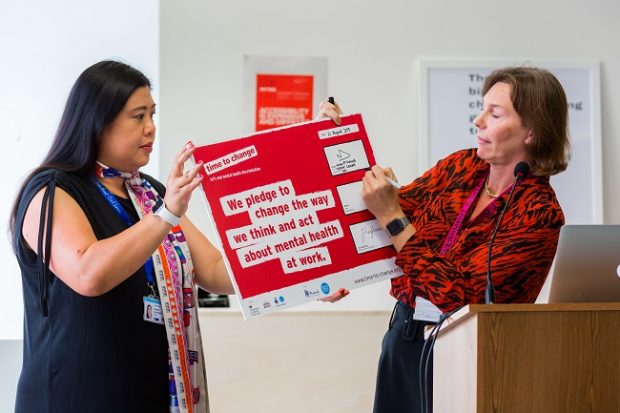GDS’ Time To Change commitments
Physical and mental wellbeing is vital for people to be happy and productive in their personal and professional lives.
In August 2019, GDS’ Director General, Alison Pritchard, signed a Time To Change pledge, aiming to change the way we think and act about mental health and wellbeing.

The pledge includes several commitments.
Create a mental health first aid service
There are currently 12 mental health first aiders at GDS, and we are working to recruit and train more - we need around 17 mental health first aiders to get to our target ratio of 1:50.
We’re working to raise awareness of GDS’ mental health first aiders, and we work alongside the rest of the Cabinet Office’s mental health first aid provision.
More importantly, we are working with the mental health first aiders to help them have the guidance, code of conduct, support and resources they need, and to get a better idea of whether that ratio is sufficient.
Make wellbeing a leadership priority
We have made wellbeing a recurring issue for GDS’ Executive Team, who, for example, agreed to a package of tailored wellbeing support for teams working on EU Exit. This included workshops around wellbeing in high-pressure environments and sharing stress measurement tools.
Around 99% of GDS senior civil servants undertook training to better understand and define psychological wellbeing, and how they can empower people to take personal responsibility for their wellbeing. In November, we set standards for senior civil service performance expectations that enable inclusive culture. This includes expecting senior leaders to visibly prioritise the health and wellbeing of their team, and foster a culture that promotes physical and mental health and wellbeing.
Improve our working environment
We will be carpeting the metal-floored desk areas at GDS, to make them quieter and less glaring places to work.
We have written and shared case studies of workplace adjustments, covering physical and mental wellbeing related adjustments.
Train line managers in wellbeing
We have run wellbeing training for line managers, helping them identify when someone is struggling, and how and when to offer support.
We will help line managers to capture information to help GDS understand staff’s mental health needs.
We will ensure line managers are aware of the support Time To Change now offers to those championing wellbeing
Communicate to staff about wellbeing
We publish a short newsletter every week, highlighting that week’s events, activities and opportunities, and a more in-depth monthly edition. We include links to resources in the GDS all-staff weeknote, and run a monthly anonymous mental health Q&A. There’s a fortnightly lunch club where people watch and discuss an online wellbeing-related talk while eating their lunch.
We also talk about wellbeing-related issues and work at all-staff events and have started running monthly drop-in sessions to get mental health first aid.
Create a WorkWell Ambassador role
Samantha Kirkland is GDS’ new WorkWell ambassador, working to join GDS up with the Cabinet Office’s wellbeing activities.
Samantha will support GDS’ wellbeing approach by creating events and activities, and signposting staff to the resources available.
Create Fair Treatment Ambassadors
GDS has 7 Fair Treatment Ambassadors and is recruiting and training more.
The Ambassadors offer a non-judgemental, empathetic, confidential, and informal listening and signposting service for anyone concerned about bullying, harassment, or discrimination. They also run workshops on recognising bullying, harassment, and discrimination; creating a positive environment; and differences between good management and bullying behaviours.
Support working practices that promote wellbeing
We give staff the flexibility to work in a way which best meets their needs, including having meetings off-site, taking regular breaks, participating in physical activity, and eating well. Staff can join the GDS circuits club, craft and knitting club, board game club, and even our very own chocolate club.
Measure wellbeing
We are rolling out regular all-staff surveys, to try and measure wellbeing, and identify things we might be able to improve. These include ways to anonymously share challenges and concerns directly with senior management, and get a direct reply.
What’s next?
We’ll continue to work to fulfil our pledges, and are setting up ways to review and make sure they’re maintained. We’re making great progress, with just over 50% of the actions completed since Alison signed the pledge 6 months in.
We’re also going beyond the pledges and taking a user-centred approach to providing the signposting and support for staff wellbeing. We’re undertaking and reviewing research and insights, to better understand what information and support colleagues need. We provide regular newsletters; a dedicated Slack channel for mental health-related topics; access to trained mental health first aiders, speakers and events; and regular anonymous peer-led mental wellbeing Q&As.
What you can do
Have a listen to the GDS podcast about our wider work on wellbeing and mental health, and if you want to find out more, contact Fiona James, GDS’s senior wellbeing champion. Check if your employer could make a Time To Change Employer Pledge too.

